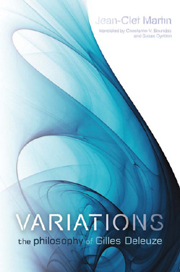Book contents
- Frontmatter
- Contents
- Letter-Preface by Gilles Deleuze
- Preambles
- First Variation: Ethics and Aesthetics
- Second Variation: Three Poetic Formulas for Nomadic Distribution
- 1 Time Out of Joint
- 2 The Dice Throw
- 3 ‘The Garden of Forking Paths’
- Third Variation: Multiplicities
- Fourth Variation: Malcolm Lowry, or, the Manifesto of Things
- Postscript to the Anglo-American Edition: What is a Multiplicity?
- Notes
- Bibliography
- Index
3 - ‘The Garden of Forking Paths’
from Second Variation: Three Poetic Formulas for Nomadic Distribution
Published online by Cambridge University Press: 12 September 2012
- Frontmatter
- Contents
- Letter-Preface by Gilles Deleuze
- Preambles
- First Variation: Ethics and Aesthetics
- Second Variation: Three Poetic Formulas for Nomadic Distribution
- 1 Time Out of Joint
- 2 The Dice Throw
- 3 ‘The Garden of Forking Paths’
- Third Variation: Multiplicities
- Fourth Variation: Malcolm Lowry, or, the Manifesto of Things
- Postscript to the Anglo-American Edition: What is a Multiplicity?
- Notes
- Bibliography
- Index
Summary
Schelling's beautiful formula – ‘All possibilities are realized’ – is both promising and deceiving if we consider the trajectory that supports it and dismisses it in one peremptory sentence serving the dispensations of a philosophy of envoy. If Schelling rejects Leibniz's idea that the world is the result of a selection or of another learned combinatorial of an infinity of possibilities, he too nonetheless subjects the world to an ontological dispensation where there can be no question of an aberrant or irrational movement. ‘All possibilities are realized’ also means that ‘everything rational is real and everything real is rational’. Behind this formula, however, we hear the grumblings of another form of distress to the extent that, as Xavier Tilliette says, the formula defies
the countless armies of unrealized possibilities, of efforts nipped in the bud, the endless process of eventualities, uncertainties, utopias, virtualities, irrealities, potentials, future contingencies – everything that could have been and was not, the realm of the conditional, with its shadow of regret, the halo of deceit and disappointments, and the mirage, extended as far as one can see, of scintillating possibilities this side of and beyond the present. (Tilliette 1987: 215)
This curious list, with its menaces and shadows, is quickly brushed aside by Hegel's unhappy declaration: Futuration, written in regret and deceit, becomes parturition. Instead of affirming shadows and halos, we now make allowances. Moreover, if everything possible is real, it is so according to ‘time’ – the time that regulates becoming and determines that which belongs to each moment in line with the distributive justice that Schelling symbolizes in The Philosophy of Mythology by the goddess Nemesis.
- Type
- Chapter
- Information
- VariationsThe Philosophy of Gilles Deleuze, pp. 105 - 118Publisher: Edinburgh University PressPrint publication year: 2010



